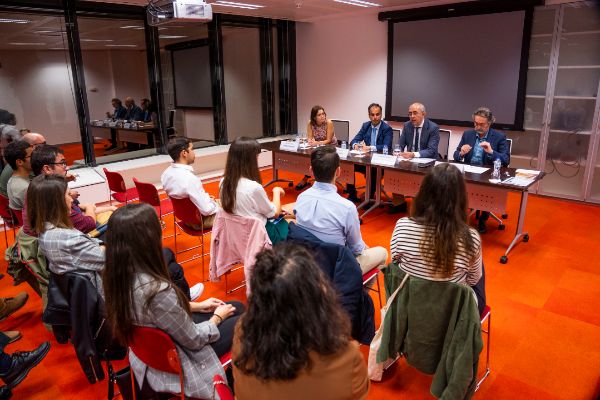The Master in Journalism of Research, Data and Visualization of EL MUNDO and the Rey Juan Carlos University celebrated this Monday the opening ceremony of its VIII edition in an act that took place at the headquarters of the Editorial Unit and in which the director of EL MUNDO, Francisco Rosell, reminded the 12 students of the new promotion that "the very essence of journalism is research," the antithesis of "declarative journalism."
Francisco Rosell recalled that "the history of Spain would not be the same without the investigations of EL MUNDO", a sign of identity for which he opted for the Editorial Unit newspaper since its founding 30 years ago, and encouraged future professionals to follow that path to "restore the importance of the facts" at a time when, as he warned, "the agents that favor misinformation have very powerful channels."
During the event, the students of the previous promotion of this master's degree, one of the most recognized in the sector and with a high rate of job placement, were also awarded diplomas. According to Antonio Rubio, director of the master's degree, 70% of the students who have completed this postgraduate course are working in different national and international media and are authors of important works such as the Panama Papers, research that was deserving of an award Pulitzer
In this edition, the inaugural act of the Master in Investigative, Data and Visualization Journalism was attended by Marianela Balbi, director of the NGO IPYS Venezuela, who delivered a presentation in which she highlighted the need for investigative journalism. The Venezuelan journalist warned of the serious risk that freedom of expression runs - "cornerstone of democracy," as she defined - in many parts of the world because of "the increase and the particularity of authoritarian governments driven by populism, and with the intervention negative technology that facilitates misinformation ».
"Journalists always have to be willing to reveal facts that power wants to hide," said Balbi, head of an organization that works in a country he referred to as "a sick body that lives in opacity."
The rector of the Rey Juan Carlos University, Javier Ramos, was in charge of closing the event with an intervention in which he reminded the students of this master that every success story should be based on three pillars: teamwork, generosity and work Without fear of failure.
According to the criteria of The Trust Project
Know more- media
The fine that CNMC poses for Mediaset and Atresmedia: 43 million for each group
30th anniversary of El MundoArturo Pérez-Reverte: "Spanish is an extraordinary common space"
MediaProfessional journalism against 'fake news'

